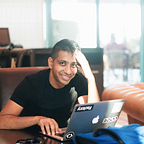Using AI To Help Governments Make Data-driven Decisions During Pandemics
Are government policies taking into account the poorest and the most vulnerable?
A migrant worker in India dies after walking 200 km on the way back to his home [1].
Rural itinerant workers in China are being blocked from cities, kicked out of apartments and rejected by companies [2].
“Poverty will kill us before the virus” — Rajneesh, a migrant worker, walking 247Km on foot to his home [3].
Chaos, confusion and a stampede-like situation prevailed at the Delhi-Ghaziabad border as hundreds of migrant workers fought amongst themselves to get seats on the limited number of buses [7].
When travel is restricted, schools closed, businesses shut down, and communities put into quarantine, individuals in those ecosystems lose their sources of income. Especially, economically marginalized communities are hit the hardest.
Have governments around the world, really thought of the effects of their actions on the poor?
To solve the current crisis (health, economic, humanitarian), we need a global effort that is sadly missing. Unfortunately, many better-off countries have taken a nationalist turn. Some places, such as the EU, are restricting the export of medical kit [4]. At these times we need citizen empowerment and global solidarity.
Where leaders fail, common people and communities can show the way.
Omdena, a global and collaborative innovation platform, is uniting AI, policy, pandemic and healthcare experts from around the world in a two month AI challenge to investigate the impact of policy decisions on the most vulnerable population.
Our aim is to make that impact be understood and considered by policymakers.
What the challenge will focus on
The lockdowns in Europe, the US, and India affect the poorest in those regions and elsewhere. We must think about those hundreds of millions who do not have savings or a pantry full of food. When those people cannot go to work every day to earn a living, the impact is devastating.
In an effort to curb the coronavirus pandemic more than 100 countries have imposed travel restrictions and 2.5 billion people or 30 percent of the world’s population, have been directed by governments to stay at home. The resulting loss of wages is expected to be disastrous to those already on the economic margins, including wage workers. And worse, such stringent lockdowns may not be even necessary. For example, the only country that is a good example in the fight against Coronavirus did so without economically damaging lockdowns [5].
Omdena is a partner of the United Nations’ AI for Good Summit 2020 and comes with a track record of successfully completed AI projects.
Our AI projects and challenges host 50 or more data scientists and domain experts who collaborate to build AI solutions to address significant real-world problems. To date, more than 900 people from 78 countries have participated in our challenges.
Examples are using machine learning to identify the safest routes after an earthquake to reunite families or cutting-edge solutions to detect the outbreak of wildfires in the Brazilian rainforest with 95 percent accuracy.
For Omdena’s Coronavirus Policy AI Challenge, the goal is to minimize the human suffering that results from pandemic policies.
‘….I would be able to judge whether the government is telling me the truth and whether it is adopting the right policies to combat the epidemic. Whenever people talk about surveillance, remember that the same surveillance technology can usually be used not only by governments to monitor individuals — but also by individuals to monitor governments.’[6].
The solutions will support policymakers and common people like us with data-driven analyses to help make informed decisions in the future.
“That’s one small step for man, one giant leap for mankind.” — Neil Armstrong
The AI Challenge is supported by the UN AI for Good Global Summit, AI for Peace, PWG, Fruitpunch AI, LabelBox, and Spell. 80 changemakers from 26 countries across 6 continents are collaborating to develop impactful solutions. Our domain experts are associated with organizations such as the World Health Organization, International Monetary Fund, The World Bank, European Commission, UNICEF USA, etc.
“We are excited to join efforts with Omdena to protect those with the least capacity to manage the burdens of this crisis — the impoverished and economically marginalized,” said Branka Panic, Founder of the think tank AI for Peace. “We aspire to help governments and international organizations deal with this and future pandemics by taking an AI-enabled and evidence-based approach to policymaking.”
If you want to read more about the challenge, find details here.
This article has been written by Laura Clark Murray and originally appeared on Omdena Blog.
[2] https://www.nytimes.com/2020/02/23/business/economy/coronavirus-china-migrant-workers.html
[3] https://www.aljazeera.com/news/2020/03/chaos-hunger-india-coronavirus-lockdown-200327094522268.html
[4] https://www.economist.com/leaders/2020/03/26/the-coronavirus-could-devastate-poor-countries
[5] https://www.nytimes.com/2020/03/23/world/asia/coronavirus-south-korea-flatten-curve.html
